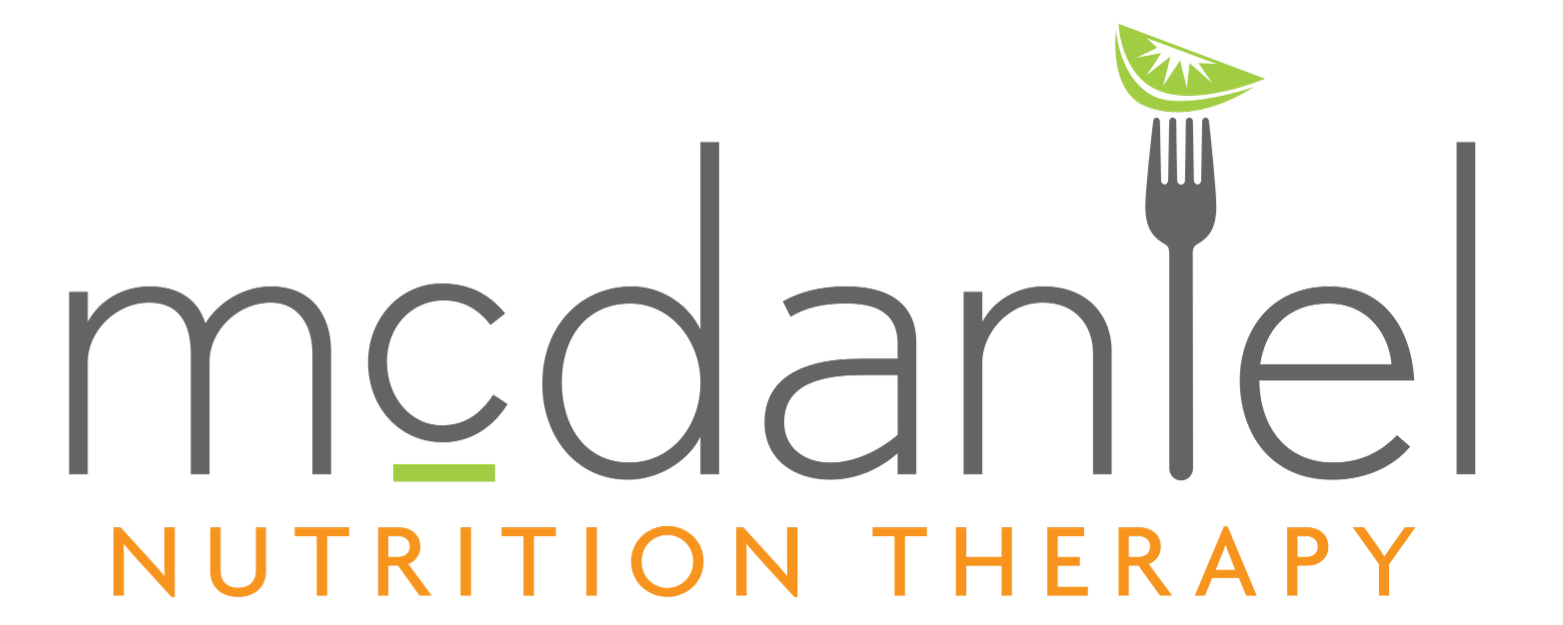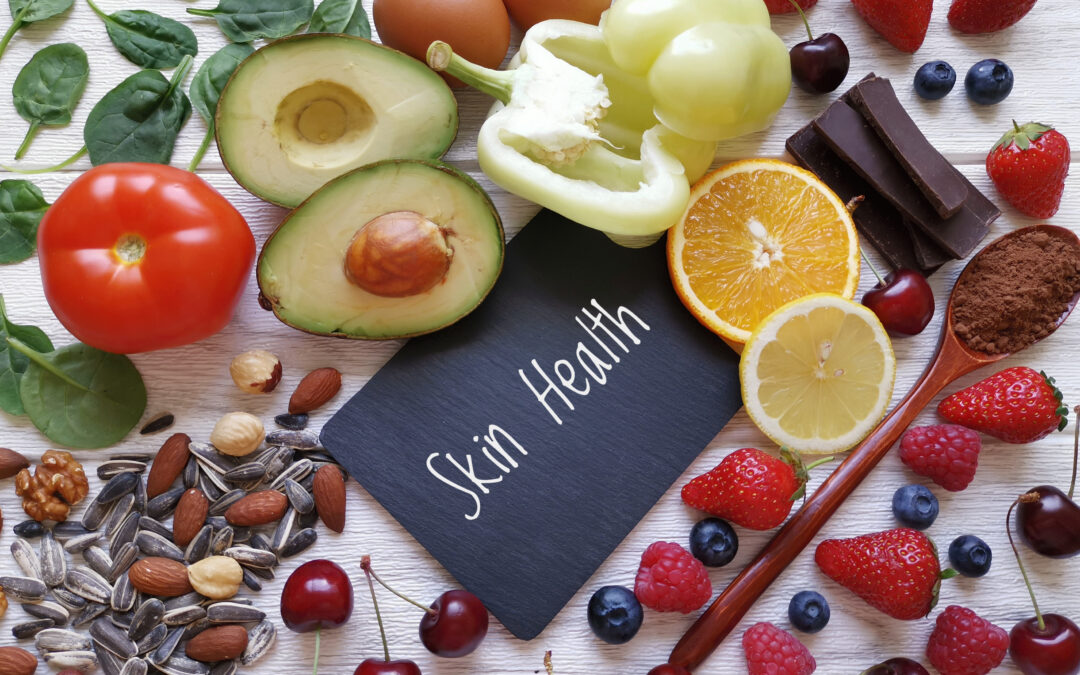Your skin is your largest organ and it plays a vital role in your health and wellness. It protects you by keeping water and nutrients in and harmful bacteria and viruses out. Your skin helps you maintain your body temperature and makes vitamin D when exposed to the sun. It’s also full of nerve endings to help you sense the outside world.
Skin care isn’t only something we need to do on the outside. What we eat and drink affects our vital organs—including our skin. Here is a list of some foods for healthy skin. Taking care of your skin helps it play its many fundamental roles and look its very best.
Foods for Healthy Skin
Your skin is a complex organ and needs a variety of different nutrients every day to stay healthy. This is especially important as you age! Here are some of my top recommended foods for healthy skin.
1. Water
You may not always think about water as an essential nutrient, but it is. Water is the main component in cells and fluids. It maintains body temperature and provides shock absorption for your joints. It’s no wonder that adults are 60% water!
When it comes to our skin, water is essential. Your skin has three layers. The outermost layer—the one you see and feel—is called the epidermis. The middle layer is the dermis and underneath that is your hypodermis. When your epidermis doesn’t have enough water, your skin feels rough and loses elasticity. The water your epidermis needs comes from the inside. One study found that when participants increased their water intake, their skin’s elasticity improved in 2 weeks.
How much water do you need every day? According to the Mayo Clinic, women should aim for 2.7 L (11.5 cups) of fluids per day, while men should aim for 3.7 L (15.5 cups) per day. These fluids can come from water or other beverages, and can even come from water-rich foods like soups, fruits, and vegetables. Your personal water needs may be higher if:
– you sweat a lot
– are pregnant or breastfeeding
– are prone to urinary or digestive tract issues like kidney stones, vomiting, or diarrhea
2. Protein
Your body’s main structure is also made from proteins. This includes your bones, muscles, organs . . . and skin.
Several different proteins make up your skin. For example, collagen and elastin are very plentiful and build up the structure of your skin. Over time, and with exposure to the elements, your body’s ability to produce collagen decreases. Keratin is another important protein in your skin. Keratin gives your skin rigidity and helps with protection.
Your body weight determines the amount of protein you need. To maintain health, you need to eat around 7 gram of protein for each 20 pounds of body weight. For example, a person who weighs 140 pounds needs about 50 g protein/day. Meat, poultry, fish, dairy, and eggs are good sources of protein. Plant-based sources of protein include soy, lentils, beans, nuts, seeds, whole grains, and even vegetables like corn, broccoli, and asparagus.
3. Essential fatty acids
There are two types of fatty acids that are essential nutrients for our health and our skin. They are linoleic acid (omega-6) and linolenic acid (omega-3). Omega-3 fatty acids are anti-inflammatory and are linked to many health benefits including improvements in rheumatoid arthritis, ulcerative colitis, diabetes, heart disease, and psoriasis, to name a few.
Skin dryness and thinning can be improved with a higher intake of linoleic acid (omega-6). Eating too little fatty acids may result in skin dryness and weakness.
Good sources of essential fatty acids are fish (salmon, tuna), shellfish, nuts (walnuts), seeds (flax, chia, pumpkin, sunflower, sesame), oils (soy, canola), leafy vegetables, and avocados.
4. Vitamin C
Vitamin C is a water-soluble antioxidant vitamin that plays many roles in your body, including in skin health.
A deficiency of Vitamin C (scurvy) results in skin lesions, bruising, and slow-healing skin. This is, in part, because of Vitamin C’s role in stabilizing the protein collagen.
You should make sure to get at least 75 mg of Vitamin C every day. Fruits and vegetables are rich sources of Vitamin C. Bell peppers, citrus fruits (oranges, grapefruits), broccoli, cauliflower, strawberries, kiwis, blackcurrants, potatoes, rose hip, and parsley are all high in Vitamin C.
5. Vitamin E
Vitamin E is a group of essential vitamins called tocopherols. They are fat-soluble antioxidants that work synergistically with Vitamin C. Together, vitamins C, E, and zinc can speed up wound healing. Deficiency of Vitamin E is linked to red, dry skin.
Vitamin E is often applied directly to the skin to reduce redness and some of the effects of sun damage. Ingesting Vitamin E helps the skin from the inside by protecting collagen and fats from breaking down.
The recommended daily allowance for Vitamin E (alpha-tocopherol) is 15 mg. You can get Vitamin E in vegetables, oils (wheat germ oil, olive oil, vegetable oil, sunflower oil), nuts (almonds, hazelnuts), spinach, broccoli, corn, kiwis, and soy.
Skin care beyond nutrition
While eating these foods for healthy skin, don’t forget other important skin care practices!
-
Use gentle cleansers and warm (not too hot) water to keep skin clean
-
Moisturize after taking a shower or washing your hands
-
Avoid harsh cleansers, fragrances, and irritating fabrics
-
If you have allergies or intolerances (e.g., to gluten or pollen), avoid those
-
Limit your sun exposure and use sunscreen, as appropriate
-
Be physically active
-
Try to get enough quality sleep
-
Use a humidifier and wear gloves when the weather is dry and cold
-
Avoid tobacco
Final Thoughts
The nutrients you consume feed your whole body—including your skin. As your largest organ with many critical roles, your skin needs a variety of different nutrients every single day. Water, protein and essential fatty acids are important macronutrients. While the antioxidant vitamins C and E are among some of the micronutrients your skin needs to heal and stay healthy.
Caring for the outside of your skin is also important. Use gentle cleansers, warm water, and moisturizers. Try to avoid irritants and allergens, too. If you have any medical concerns with your skin, see your healthcare professional.
For a nutritious approach to skin health, consult a registered dietitian. They can help you add these skin-nourishing foods to your diet. Our team can help. Click here to book an appointment with one of our dietitians today!

